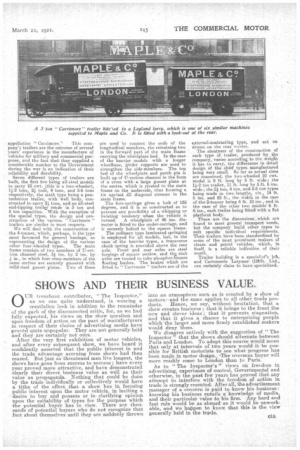SHOWS AND THEIR BUSINESS VALUE.
Page 19

If you've noticed an error in this article please click here to report it so we can fix it.
OUR trenchant contributor, " The Inspector," aswe oan quite understand, is wearing a crestfallen look in addition to the remainder of the garb of the disconcerted critic, for, as we had fully expected, his views on the show question and upon freedom of action on the part of manufacturers in respect of their choice of advertising media have proved quite unpopular. They are not generally held and they are certainly not ours.
After the very first exhibition of motor vehicles, and after every subsequent show, we have heard it confidently asserted that the public interest in and the trade advantage accruing from shows had then ceased. But just as threatened men live longest, the shows have gone from success to success ; have every year proved more attractive, and have demonstrated clearly their direct business value as well as their value as propaganda. Nothing that could be done by the trade individually or collectively would have a tithe of the effect that a show has in focusing public interest upon the motor vehicle, in inciting a desire to buy and posses or in clarifying opinion upon the suitability of types for the purpose which the potential buyer has in view. There are thousands of potential buyers who do not recognize that fact about themselves until they are suddenly thrown
into an atmosphere such as is created by a show of motors—and the same applies to all other trade pro
ducts. Hence, we say, without hesitation, that a show creates business ; that it brings to the front the new and clever ideas ; that it prevents stagnation,
and that it gives a chance to enterprising people which-the larger and more firmly established makers would deny "them.
We diaagree entirely with the suggestion of " The Inspector " that the shows should alternate between Paris and London. To adopt this course would mean that only at intervals of two years would it be possible for British motorists to see what progress has been made in motor design., .The overseas buyer will more readily come to London than to Paris.
As to "The Inspector's" views on freedom in advertising, experience of control, Governmental and otherwise in the past few years has proved that any attempt to interfere with the freedom of action in trade is strongly resented. After all, the advertisement manager of a concern is paid to know his business: knowing his business entails a knowledge of media, and their particula'r value to his firm: Any hard and fast rule would be as absuxd as it would he unworkable, and we happen to know that this is the view ' generally held in the trade.
































